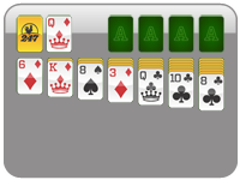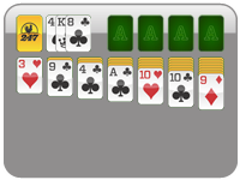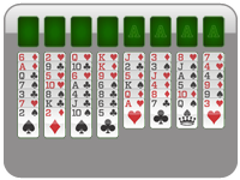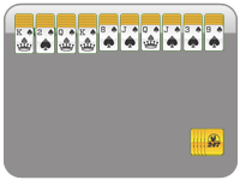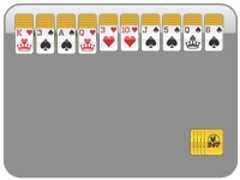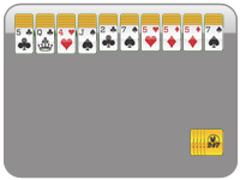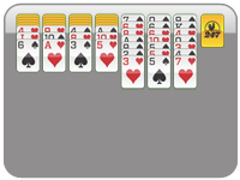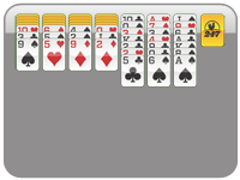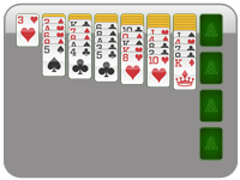Does Playing Solitaire Help Your Brain?

It can start with something as small as a forgotten classmate from high school or a blank remembering a movie, but it’s unavoidable that your memory can deteriorate as you get older. There are natural solutions like eating less added sugar, introducing meditation into your daily routine, or adding more Cocoa to your diet.
But you can also look for more interactive ways to keep your memory sharp. It’s even possible that your friends and family members have advised you to play memory games like Solitaire. However, does playing solitaire help your brain, and what about other online memory games for adults? Well, the answer is a resounding yes. Before we get into some entertaining online memory games for adults that can challenge your brain, test your memory, and improve your brain function, let’s delve into how games like Solitaire are good for your brain.
Benefits of short-term memory games for adults
You might not even realize that some of the games you already play have been helping your brain to work at its peak condition. If you play Wordle with your friends or do a daily crossword, you’re already taking care of your memory and even working to stave off conditions like dementia. Here’s an in-depth look at how memory games for adults specifically affect your brain.
Your brain is a muscle. Train it.
You may not think of it in the same way, but your brain is a muscle and requires the same kind of consistent care and maintenance as any other part of your body. Just as lifting weights or running on the treadmill will improve your fitness, so too can daily memory games improve your retention and brain function.
According to Rebecca Marcus, a licensed New York psychotherapist, brain games can help you increase your focus, concentration, and memory and elevate your moment-to-moment awareness and ability to be present. And brain-training games like Lumosity have been proven to help improve attention levels, memory, response time, and logic skills if played over a long period.
Reduced risk of dementia
All of those functions are important to maintain as they factor into how your memory declines as you become older. They can also contribute to the possibility of later issues with the brain. In fact, studies show that regular activities like crosswords can delay or slow down the onset of age-related cognitive decline conditions such as dementia.
Another experiment at Cambridge University concluded that regularly engaging in memory-based activities like reading, playing checkers, and finishing jigsaw puzzles significantly reduced the likelihood of developing dementia.
Better attention and logic skills
Memory games don’t only contribute to your retention abilities, they can also lead to better attention and logic skills in your daily life. Games that require both logic and visual comprehension can challenge both sides of your brain and hone your ability to solve problems.
Studies also show that play-based learning processes can be more successful than more traditional teaching methods. Particularly, game-based learning helped test subjects use critical thinking approaches that wouldn’t be possible in a classroom setting. Further, there is evidence that brain teaser games can positively influence the central nervous system and decrease stress levels. So let’s get to playing!
11 of the best online memory games for adults

You’ve heard about a few of the benefits of memory games, and now it’s time to talk about your various options. These include online versions of beloved games, curated intelligence challenges, and all sorts of brain-training teasers.
Here are some online memory games for adults that can help you sharpen your memory:
Scrabble
Scrabble - Available since 1948 as a board game, Scrabble is now available as a free online game, this perennial word game tests your vocabulary and language recall.
Sudoku
Sudoku - This Japanese logic-based number puzzle can be found in magazines, newspapers, and free online. In Sudoku, the player is tasked with filling out every row and column of a 9x9 board with the numbers 1-9 without repeats. This game tests short-term memory, but also critical thinking as you need to predict when a move will have consequences in the future.
Crosswords
Crosswords - You can still find crosswords in most newspapers and activity books, but there are plenty of online options with their own spectrum of difficulties and features. USA Today is usually known as the easiest daily free choice, but more seasoned players might want to try their hand at The New York Times crosswords, which has a reputation for bending the keenest minds.
Solitaire
Solitaire - You may have already played a version of Solitaire on your phone or computer, but there are so many more involved ways to take it to the next level. Featuring nine different types of Solitaire (1 card, 3 card, Freecell, Spider 1 Suit, Spider 2 Suit, Spider 4 Suit, Scorpion, Wasp, and Yukon), 247Solitaire is an easy, robust way to play Solitaire online and sharpen your memory skills.
Chess
Chess - Available on a variety of free online platforms where you can challenge both computer players and real people, playing Chess can result in better brain function, improved memory and cognitive abilities, strategic thinking, and increased attention spans.
Portal and Portal 2
Portal and Portal 2 - Valve’s series of acclaimed first-person platformer games, Portal and Portal 2, are among the most influential games in video games history. Equipped with a portal gun, the player must navigate a series of devious levels that appear impossible until you realize they just need a little manipulation.
Lumosity
Lumosity - Designed and tested by scientists, Lumosity offers games that focus on improving memory, processing speed, and problem-solving skills. A free account allows you to play three games a day, but it will cost about twelve dollars a month for the full package of games and features. It’s available on Apple and Android.
Elevate
Elevate - Once named Apple’s app of the year, this subscription-based service offers forty games that cover categories like writing, vocabulary, reading, and math. The Elevate app is free to use, but users can also spring for the $4.99 a month plan if they want more tailored workouts.
Peak
Peak - Another subscription-based brain training app, Peak differentiates itself with games that are short and intense and a system that assigns a personal coach to the player for motivation.
Set
Set - A free online adaptation of the popular card game, Set tasks players with finding the shared qualities among a series of cards with shapes on them. It may look simple, but is deceptively difficult.
Wordle
Wordle - One of the biggest games in the world, Wordle is probably the most familiar online game on this list. In six chances, the player has to guess a specific five-letter word based on the placement of the letters. That’s simple enough, but combined with an easy-to-read score-sharing system and a quick pace, this game has become just as regular as a cup of coffee for many. As of this moment, Wordle is still free to play on all platforms.
Remember to add memory games to a routine
Even if you’ve thought about playing games like Solitaire, you’ve probably always asked yourself “Does Solitaire help your brain?” Well, you now know that it isn’t only Solitaire but even some of the other games that are good for the brain. Whether you decide to play them every morning or night, adding memory games consistently to your daily routine is an easy and effective way that you can take care of your memory. Find more fun free memory games for a quick brain workout!
Solitaire Games
More Solitaire Games
More Games
Solitaire News
Disclaimer
DISCLAIMER: The games on this website are using PLAY (fake) money. No payouts will be awarded, there are no "winnings", as all games represented by 247 Games LLC are free to play. Play strictly for fun.

